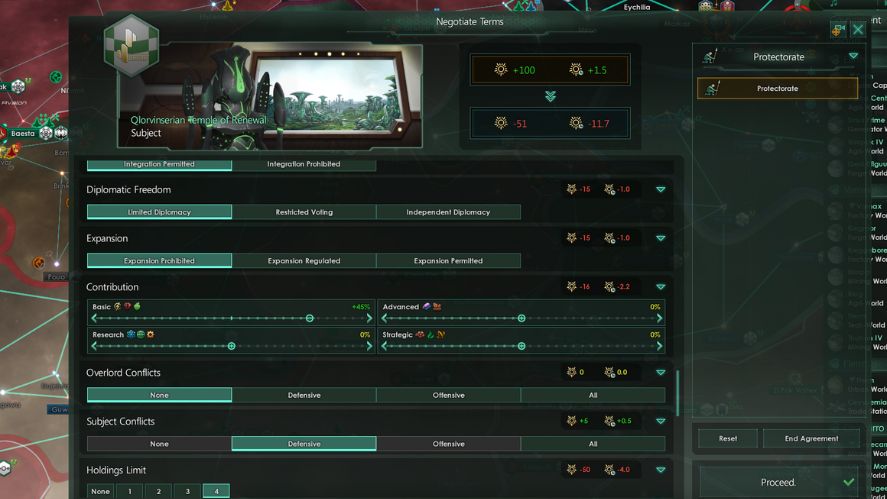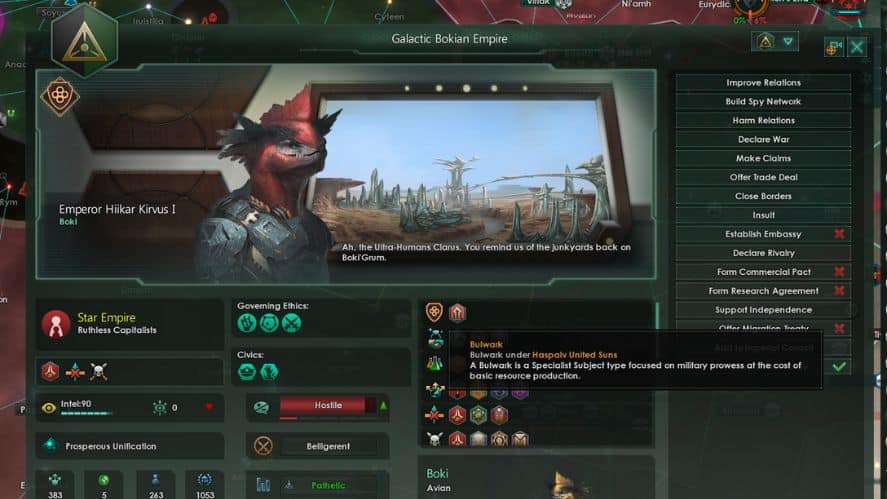Vassals have changed a lot throughout the life of Stellaris. In the past, they were bland, dull, and all the same. Now they specialize and can become the perfect partner.
Paradox Interactive even saw fit to devote an entire DLC to changing how vassals work with the Overlord DLC. As with all their major content releases, it was released with a substantial patch, so there is advice in this guide for non-overlord owners as well.
Recommended Read: How to Play Necrophage in Stellaris
This guide will cover what different types of vassals there are, what they bring to the table, their strengths, and their weaknesses. By the end of the guide, you will know what the best vassal type is in Stellaris.
From best to worst, the best vassal types in Stellaris are tributary/subsidiary, standard vassal, scholarium, satrapy, prospectorium, bulwark, and protectorate. Vassals are a nice commodity to have, but they are never a vital component of a powerful empire.
Table of Contents
The Best Vassal Type in Stellaris
Vassals are a cool feature in Stellaris. It is a great way to farm end-of-game points; they widen your empire’s influence, and it feels good to bring troublesome empires to their knees. They also come with a laundry list of risks.
There is the constant threat of insurrection; they can end up costing you money, and managing them is yet another tedious task one must manage. Not only that but there is a long list of subsystems you have to be aware of to make the most of the vassals.
Your vassals create value in a lot of different ways; they may pay you resources, assist with research, help in wars, or, in the case of specialized vassals, provide unique empire-wide modifiers. This all depends on the type of vassal they are and the vassal contract itself.
While we won’t cover the intricacies of the vassal contract in this guide, you should be aware that this is a set of promises between the overlord and the subject that both parties must adhere to. These terms may be a symbiotic relationship, or one side may leach from the other.
This brings us to the vassal types, of which there are eight. For the most part, the difference in power level between the vassal types is very minor.
The exception is the final vassal type that we cover; that one is bad, and you should always avoid it.

Vassals also add great role-play opportunities for your empire.
If you run a military dictatorship, collecting multiple vassals will probably be high on your priority list; conversely, pacifist isolationist empires will tend to avoid vassals altogether.
The following headings list all the vassal types, from best to worst.
The ranking only takes into account power levels and doesn’t consider the type of empire you may be playing. The order is also very subjective due to the minor differences in power level.
1. Tributary/Subsidiary
The first and foremost choices for vassals are the tributary and subsidiary vassal types. They are two different types of vassals, but they are exactly the same in terms of gameplay.
The difference is that tributaries are for standard empires, and subsidiaries are for megacorps.
These are available to almost every empire, and you do not need to own any DLC to make use of them. What makes them so great is the profits you can make with them and how easy they are to manage.
Almost no terms are off-limits when it comes to tributaries and subsidiaries. For all intents and purposes, they are the same as standard vassals, with one major difference: they can and will pay you tribute, and never the other way around.
There are no terms that can get forced upon you that involve you paying the vassal. That is everything we could ever want right there. They are not here to fight with you, and they will have to look out for themselves.
Having a great relationship with a tributary is like having a passive income; the money comes in with little to no effort, and everyone is happy. You will need to help them in defensive wars, but that is a small price to pay.
2. Standard Vassal
If you are looking for a more bespoke experience when it comes to managing vassals, look no further than the standard vassal type. Once again, this type is available to all empires, and you do not need to own any DLC either.
Often, you take on these empires as a slow and steady process of taking over all of their territory by integrating them. It takes time but is a lot cheaper and less hassle than waging an all-out war on them. Plus, your empire may not approve of that kind of aggression.
When it comes to modifying the vassal contract, you are free to do whatever you want here. You can force them into your wars, limit their diplomatic power, integrate them, or even do something nice.
Of course, if you keep bullying your subjects, they will grow to resent their lot in life over time. You will have to keep a close eye on them for signs of mutiny. Sometimes these vassals can cost you resources as well; be sure to check the vassal contract often.
If you use the contract properly, you can make cheap copies of every other type of vassal in the game. While the bonuses you get will never match the vassal type you are copying, you do get to choose the drawbacks instead of the game forcing them on you.
3. Scholarium
Never far from the top is the option that revolves around research. The scholarium is the first vassal type that is one of the specialized editions and does need the Overlord DLC installed to use.
As a specialized vassal, both the overlord and the subject receive some rather unique bonuses that exist outside the vassal contract system.
The overlord will gain bonuses for research speed and can build special holdings on the vassal planets.
What makes a scholarium the greatest of the specialized empire types is that you may not have to pay any form of tithe to them, and they will always be paying you free research, no matter what. So helping them develop into a research powerhouse is best for everybody.
As always, research is king in Stellaris, and this vassal type can net you some pretty outrageous research output if you set it upright.
You will, of course, have to protect your vassal, but you will want to do that anyway to ensure their scientific advances do not wane.
The problem is that as your vassal increases in level, so do the penalties they receive towards military power. This makes your task of defending them a harder one, as before long, they will not be able to defend themselves, making them easy targets for your enemies.
4. Satrapy
The hardest kind of vassal to acquire is satrapy because the galaxy needs to be in a very specific state before it is even an option. First, the great Khan mid-game crisis has to happen in your galaxy.
You must defeat the Khan in fleet combat and kill them. Then, the Khan needs to channel their inner Palpatine and somehow return.
After defeating them in ship combat a second time, there is a chance that you may receive the Khan’s throne relic as a reward.
This relic allows you to create satrapy vassals, which are offense-focused vassals. Great for conquering, but won’t come to your aid if aliens are bombing your home world. This is the best role-play vassal, but it also comes with a few good power benefits.
Satrapies will never expect a tithe from you and can provide you with tribute if you choose to go down that path. Also, 30% of their naval capacity goes to their overlord. This enables the overlord to create even more doom stacks to combat the late-game threats Stellaris will throw at you.
Satrapy vassals are immune to integration, but other than that, you are quite free to control them as you see fit. For those who have always wanted to make themselves the Khan, this is the route you want to take.
5. Prospectorium
Continuing the trend of specialized empire types having dumb names is the prospectorium vassal type. These vassals are all about producing gargantuan amounts of resources and sharing that wealth with their overlord.
Of course, this vast wealth does come with a cost. As a specialized subject, they can never get integrated by their overlord, and the overlord will have to provide research aid to the prosectorium.
Apart from that, you can do what you like with these vassals. You are never expected to protect them, nor are they expected to come to your aid either.
Although you are getting a good income from them, it would make sense for you to offer those services to your subject to guarantee their loyalty.
As the overlord of a prospectorium vassal, you also get some unique bonuses. Both mining stations and planetary buildings become cheaper and faster to build. This is an advanced version of the tributary in a way.
The reason this is weaker than a tributary is the very steep research costs one of these vassals can cost you at later levels.
You should always be prioritizing research until very late in the game, and a prospectorium is a deadweight to your research potential.
Once you have researched supertechnologies such as megastructures, the value of this vassal increases, but before then, you may want to think twice about this type of subject.
6. Bulwark
The final of the good vassal types is also the last specialized type of empire, and that is bulwark. This subject focuses on bolstering the defenses of both parties and can become very expensive.
Bulwarks are always expected to support you in some form of warfare, and you assisting them is always a choice. You also receive boons for starbase upgrade costs and upgrade speed.
A much more useful bonus is the crime reduction and stability boosts to planets within your shared relay network.

While bulwarks are not a bad choice for vassal types, they are certain to be one of the weaker choices. You will always be paying them some sort of resource, and at later levels, the amount they expect can get pretty ridiculous.
Their worst feature, by far, is that they are a little bit boring.
Their bonuses encourage them to set up hard-to-breach defense points, which, while not being the most effective strategy, is also a bit dull. You want to be taking the fight to the enemy, not waiting for them to fall on your axe.
I should also mention that you will need to have the Overlord DLC enabled to try out this vassal type.
7. Protectorate
The first and only bad vassal type is the protectorate vassal. This is only for vassals that are so weak in comparison to yourself that you have taken pity on them and declared them under your protection.
Now, I know I said this is a “bad” vassal type, and I do mean that if we only look at it through the lens of pure game power. But if we shift our focus a bit, protectorate could be the greatest vassal type.
You may be playing a game of Stellaris, and you are role-playing an empire of peaceful spiritualists. Well, then taking on protectorates could be the most important thing to your empire as you seek to defend them.

If playing this way is fun for you, then congratulations because that is what the game is all about. But getting back to a numbers perspective, protectorates stink and are seldom anything but a financial burden for your empire.
You will be paying them resources and research, and you have to protect them in wars.
Lucky for us, they are so weak that making the decision to integrate them into your own empire is allowed, and they won’t be able to do much to stop you either.
This is everything you need to know about the best vassal types in Stellaris.
If you have any questions or suggestions for this guide, please let us know in the comments section below. As always, have fun creating the most powerful vassals you can in Stellaris.




